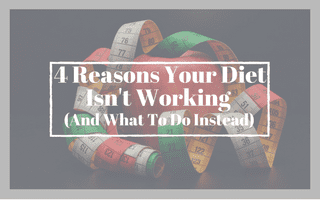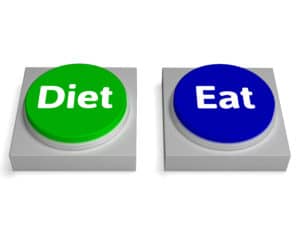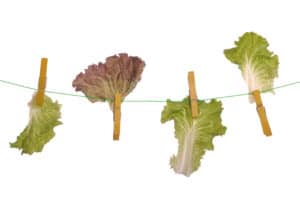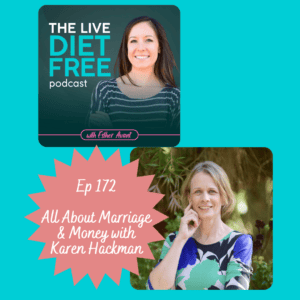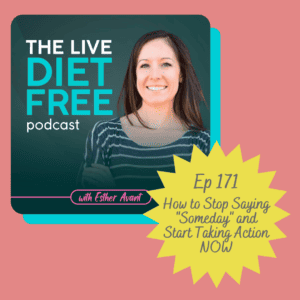Drastic dieting that is too restrictive is unsustainable. Here’s why your diet isn’t working and what to do instead.
After putting on a few pounds you decide to do something about it. You do some research, ask some friends, and end up with a lot of conflicting answers.
You settle on this new, crazy-sounding diet that your sister’s coworker’s niece went on. She lost 30 pounds and looks amazing. If you can have results like hers, it’ll be worth it, regardless of how ridiculous you feel wrapping yourself up in plastic wrap or swallowing pills every 3.5 hours.
Initially, it things go well. You drop a few pounds. You’re already exhausted from the effort, but, hey… it seems to be working. But with each passing day, it becomes harder and harder to stick with the plan. The next thing ya know, you somehow end up surrounded by snack food remnants.
You know what happens next.
It’s all downhill after this. You end reverting to your normal diet. You regain all the lost weight….and maybe add a few bonus pounds.
What happened?!
If you’ve had this experience, or one like it, you are not alone. In fact, 95% of diets fail. Most women will regain any lost weight within 1-5 years.
Stop sabotaging yourself. Start correcting these four common mistakes.
Your diet is too drastic
You’re so fed up with your circumstances that you decide the only course of action is a complete and immediate diet overhaul. You know the drill. You arm yourself with garbage bags and go on a kitchen rampage, throwing away everything that isn’t kale.
Once this step is complete, you head straight to the nearest Whole Foods because you’re a person who shops there now. You buy more kale – organic, of course – and some apple cider vinegar because the label says, “raw, unfiltered, and with the ‘mother,’” which must be good.
You head home, expecting to go from whatever is your “norm” to fully compliant on a diet or plan that’s completely unfamiliar.
Not only is this contrast a complete mindf*ck, but it sets you up for failure. Since you haven’t eased into these massive changes, it’s only a matter of time before you revert to your “norm” again.
What To Do Instead: Lasting weight loss happens as a result of gradual habit changes. Rather than opting to change everything at once, change just one thing at a time. Do that one thing day-after-day until it becomes effortless. Then pick another small thing and change that. Over time, these small changes will add up to massive results, all without resorting to drastic measures.
Your diet is too restrictive
Ever tried a diet that required you to eliminate entire food groups or eat only certain things (grapefruits or maple syrup lemonade, anyone)? Surely, you have. Diets like this are among the most common.
You may have even lost some weight; elimination diets often get results. Anytime you minimize the amount of food you’re “allowed” to take in, you’re likely to lose some weight. It’s not because you’ve eliminated that food, in particular, just a byproduct of eating less.
Unfortunately, restrictive diets have a major flaw.
What happens when you’re told that you can’t have something? It makes you want it more. It’s human nature. When something is made off-limits, suddenly it becomes irresistible. You know this if you have kids but the same goes for adults and food.
White-knuckling your way through a restrictive diet puts you at risk of developing an unhealthy relationship with food and more likely to binge on the “forbidden foods” when your willpower can’t take it anymore.
Even if you successfully make it through your 10- or 30-day restrict everything diet, what happens when you go back to normal eating? The weight comes back.
The diet – and whatever it’s required you to eliminate – hasn’t done anything magical for you. It’s simply required you to eat less.
What To Do Instead: People who successfully lose weight and keep it off do so by eating a balanced and varied diet that allows for any type of food to be eaten with moderation. This doesn’t mean you have to eat any certain food, especially if you know it’s a trigger food for you or makes you feel ill. It just means that you’re not arbitrarily demonizing certain foods in the name of weight loss.
Your diet is unsustainable
A diet that is too drastic and/or restrictive is unsustainable. Any weight you lose on an a diet like this is likely to return once you can’t white knuckle your way through it anymore.
This might describe your diet if:
- you find yourself missing out on social events due to issues with, or anxieties about, food
- you restrict all day and binge at night
- you’re counting down the days until you can have __(currently banned food)__ again
If your goal is to lose weight temporarily, you might be onto something. But if you would prefer to lose weight and keep it off long-term, diets like this have a major fatal flaw:
An unsustainable diet means unsustainable results.
You would prefer to go out with friends and be able to order off the menu. Or enjoy a special event without wondering if there’ll be anything you’re “allowed” to eat. You’d like to make it through a day without spending every minute thinking about food. And then end the evening on a good note, not with yet another ice cream binge.
What To Do Instead: The most reliable way to lose weight and keep it off is to eat in such a way that you do not feel deprived and can see yourself eating long-term. Yes, there will be periods where you choose to tighten things up in an effort to reach certain goals. But the majority of the time, you should feel be eating in such a way that you can indulge mindfully and intentionally and not be miserable all the time.
You aren’t learning how to fish
The thought, “I just want someone to tell me what to eat” has probably crossed your mind a time or two. Maybe you’ve even gone so far as to find a dietitian who will write a meal plan for you, detailing specifically what, how much, and when to eat to lose weight.
After all, how hard can it be to just follow directions?
Well, the following situations could pose some issues:
- when your meal plan calls for 10 stalks of asparagus but you only have 4 left
- when you’re supposed to have broccoli everyday at lunch but you hate broccoli
- when you’re at a friend’s house and she serves chicken even though your meal plan calls for turkey
- when you’re at a work lunch and can’t find anything on the menu that you’re allowed to eat
Instead of learning how to make your own healthy choices, you’re becoming reliant on an inflexible document to dictate all your decisions. A document that leaves you high-and-dry when “life stuff” pops up.
Even if you do make it through your however-long meal plan diet, what happens when it ends and that meal plan is no longer there to serve you or dictate your decisions?
You’ve been given fish (likely tilapia, and lots of it) but not taught how to fish.
What To Do Instead: If you want to maintain the results you get while following a specific plan, you need to have the tools to survive without it. Sustained weight loss comes as a result of learning how to make better choices day in and day out, until they become second nature.
Where to go from here
Learning the nutrition basics is the most important step you can take to ensure you’re losing weight in smart and sustainable way.
What are the basics?
(1) Learning to eat slowly and enjoy your food (and allow your body to digest properly.)
(2) Stopping before you stuff yourself.
(3) Put together balanced meals of lean protein, veggies, carbs, and healthy fats
(4) Learn how to eyeball appropriate-for-you portions.
The Body Transformation Guide is the perfect resource to help you learn and practice these things. Armed with all the info in there, you’ll not only learn the requisite skills to maintain any future weight loss, you’ll probably lose a good chunk of weight while you’re at it.
Download it here.

